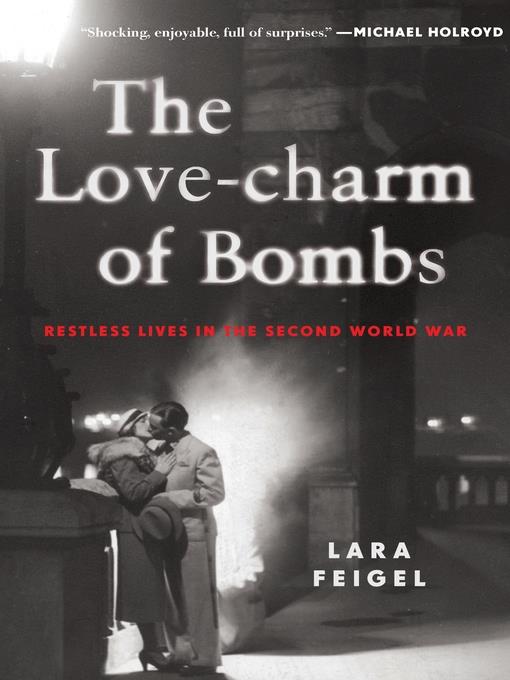
The Love-charm of Bombs
Restless Lives in the Second World War
کتاب های مرتبط
- اطلاعات
- نقد و بررسی
- دیدگاه کاربران
نقد و بررسی

April 22, 2013
Despite its unending parade of declarative sentences, this is an affecting, critically perceptive contribution to history, literary history, and literature itself. Centering her story on Blitz-battered London between 1940 and 1945, Feigel (Literature, Cinema and Politics, 1930–1945), a specialist in British culture in the 1930s and ‘40s, vividly brings to life the tangled professional and amorous links between her five main characters, all of them writers—Elizabeth Bowen, Rose Macauley, Graham Greene, Henry Yorke (a.k.a. Henry Green), and Hilde Spiel—and the many others in their lives. More importantly, she sensitively illuminates their literary and other works by investigating the texts themselves for keys to their lives, thoughts, and loves—“art in the service of life,” as well as “life in the service of art.” For Feigel, her protagonists’ London was not the city of propagandists’ civic engagement but one of romantic and sexual exuberance never recovered in the inevitable post-war letdown. For most of them, “the war remained a charmed pocket of unrepeatable happiness.” It’s hard to imagine any reader of Feigel’s book not wanting to read or revisit her main characters’ novels and other writings. An absorbing, insightful work. Map and photos.

May 15, 2013
With bombs falling across London between September 1940 and May 1941, five writers of various ages and backgrounds, selected by the sharp eye of Feigel (English and Medical Humanities/King's Coll., London; Literature, Cinema and Politics, 1930-1945, 2010, etc.), shifted into romantic overdrive. The imminent threat of destruction thrust the vulnerable inhabitants of this targeted city into a "suspended present" where "intense emotions could flourish," writes the author. The five writers (Graham Greene, Elizabeth Bowen, Henry Yorke, aka Henry Green, Rose Macauley and Hilde Spiel) were decidedly literary, well-connected, mostly married and with solid humanitarian intentions that allowed them to aid in the Blitz crisis without actually going to war. Greene and Yorke hastily moved their wives and children to the countryside to pursue dalliances under fire; Greene, in Bloomsbury, and Elizabeth Bowen, in Marylebone, both worked as Air Raid Protection wardens at night. Yorke was a firefighter, and Macaulay, unmarried but involved for 20 years with her secret lover, Gerald O'Donovan, was an ambulance driver. While these four were directly involved in the action and writing their eyewitness accounts (later to be worked into their wartime novels and memoirs), the Austrian-born Jewish author Spiel was ensconced in a cramped flat in Wimbledon with her refugee parents, daughter and journalist husband, Peter de Mendelssohn, who worked at the Ministry of Information (as did Greene). While the others enjoyed a "good war," full of danger, sexual intrigue and heavy drinking, Spiel found her release after the war's end, when she returned to Vienna as a correspondent and recorded unbelievable devastation. These writers left an invaluable record of the war's toll, both physical and emotional, as researched doggedly by Feigel. A writerly work that entices readers to seek out the titles in question.
COPYRIGHT(2013) Kirkus Reviews, ALL RIGHTS RESERVED.

June 15, 2013
Feigel (English, Kings Coll.; Literature, Cinema, and Politics, 1930-1945) simultaneously pens a history of wartime London during the Blitz (1940-41) and biographical snapshot of Elizabeth Bowen, Henry Green, Graham Greene, Rose Macaulay, and Hilde Spiel, whose romantic and creative passions were ignited by the war. Willingly transformed into firefighters, ambulance drivers, and nurses, the authors through their romantic and sexual encounters recorded here show how pervasive the sentiment of exhilaration really was, though less commonly documented. Feigel suggests that World War II provided the welcome opportunity not only to write passionate characters but to become these characters in real life. VERDICT This meticulously researched biography (boasting 39 pages of notes and bibliography) reads as a historical narrative--action explodes from the page--with descriptions of firefighting using primitive equipment, snuffing out incendiary bombs wearing helmets, and desperate surgical procedures. By contrast, amorous meetings in dim bars, quiet but for the sound of the distant air raid sirens and muffled "choom" of another bomb silencing the love of a fellow Londoner are heard somewhere in the city. Recommended to fans of the featured writers, World War II history, and biography.--Benjamin Brudner, Curry Coll. Lib., Milton, MA
Copyright 2013 Library Journal, LLC Used with permission.

























دیدگاه کاربران